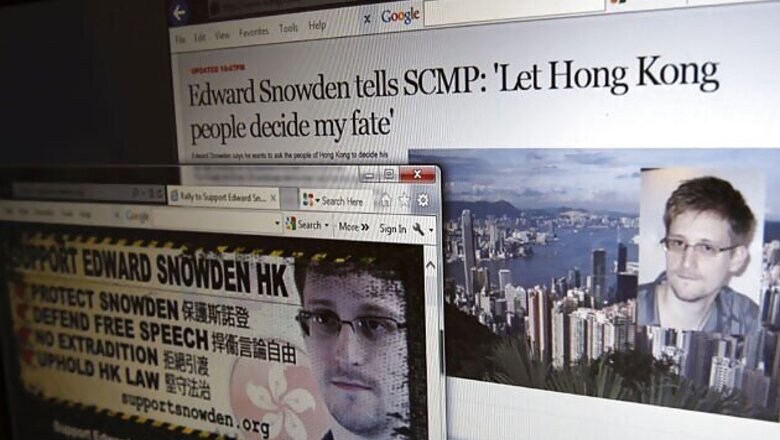
views
Edward Snowden's disclosure of U.S. surveillance programs and the ease with which he slipped out of the country have raised questions about the U.S. government's handling of his case at crucial moments, some stretching back years.
Here are some key areas of concern that have emerged following the leaks by Snowden, who most recently worked as a contractor for the U.S. National Security Agency:
2011 BACKGROUND CHECK
* Snowden's 2011 background investigation, to renew his security clearance when he was working as a private U.S. government contractor, is under scrutiny.
* Patrick McFarland, the inspector general of the Office of Personnel Management, told Congress on June 20 "we do believe that there may be some problems" with that investigation.
* The 2011 background investigation was carried out for the Office of Personnel Management by USIS, the largest private provider of federal government background checks. That company is under investigation.
* Hiring screeners at Booz Allen Hamilton also found possible discrepancies in a resume submitted by Snowden, a source with detailed knowledge of the matter said last week. But a company spokesman told Reuters on Wednesday: "Booz Allen conducted its background screening on Edward Snowden before his employment with us, our questions were answered, and the action was completed to our satisfaction."
HOW DID SNOWDEN LEAVE WITH TOP SECRET DOCUMENTS?
* Snowden worked at Booz Allen Hamilton for less than three months before the leaks emerged. But he was employed by the Central Intelligence Agency from 2006 to 2009, when he primarily worked overseas, and by Dell Inc from 2009 to 2013, when he worked in the United States and Japan as a NSA contractor.
* Before fleeing to Hong Kong on May 20, Snowden told his supervisor he needed time off for treatment of epilepsy. When he failed to return, and the company could not find him, it notified intelligence officials because of Snowden's high-level security clearance, according to a source familiar with the events.
* Government agents spent several days trying to find Snowden, according to the source, but they were unable to do so before the first news story based on Snowden's revelations appeared in the Guardian and then in the Washington Post.
* General Keith Alexander, the head of the National Security Agency, has acknowledged he does not know why his agency failed to prevent Snowden from leaving Hawaii with a trove of secrets.
INEFFECTIVE REQUESTS TO HONG KONG
* The United States filed a sealed criminal complaint against Snowden on June 14 and a day later asked the Hong Kong government to detain him as a prelude to an extradition request.
* Hong Kong stated that the U.S. request was insufficient to apprehend him, the same day it allowed Snowden to leave for Moscow on June 23.
* Hong Kong authorities say they asked the United States to clarify Edward Snowden's middle name before they would agree to detain him. Hong Kong Secretary for Justice Rimsky Yuen said U.S. authorities used James in some documents while just J. in another. Hong Kong immigration records showed his middle name as Joseph.
* A U.S. Justice Department spokeswoman said Hong Kong used the supposed confusion around his middle name as a pretext for not acting.
QUESTIONS ABOUT CRIMINAL CHARGES
* U.S. authorities charged Snowden with theft of U.S. government property, unauthorized communication of national defense information and wilful communication of classified communications intelligence to an unauthorized person.
* Experts said the U.S. extradition treaty with Hong Kong could have shielded Snowden over the last two charges as they could be seen by courts there as political acts.
* John Banzhaf at George Washington University Law School said the charge of theft also did not appear applicable. Among other things, he cited a Justice Department manual stating that prosecutors must be prepared to prove "the defendant's dealings with the property constituted a fraudulent conversion or appropriation of it to his own use." Snowden, Banzhaf says, appears to have obtained the documents to make them public.
SHOULD SNOWDEN'S PASSPORT HAVE BEEN REVOKED SOONER?
* The U.S. State Department did not revoke Snowden's U.S. passport until June 22, more than a week after the United States filed sealed criminal charges against Snowden on June 14 and a week after it requested that Hong Kong authorities arrest him.
* Some U.S. lawmakers have asked whether revoking his passport earlier might have complicated Snowden's June 23 exit.
NO INTERPOL 'RED ALERT'
* The United States didn't issue a so-called "red notice" to ask Interpol, the international police organization, to help apprehend Snowden in Hong Kong. White House spokesman Jay Carney said such notices were most valuable when a fugitive's whereabouts were unknown - which wasn't the case with Snowden.




















Comments
0 comment